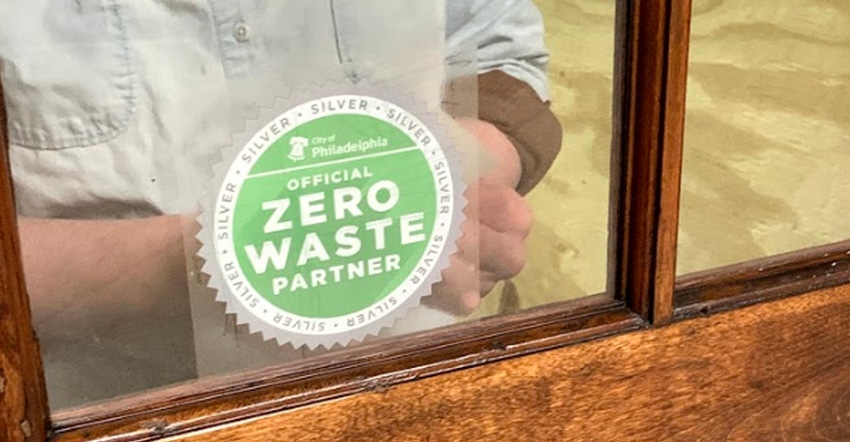
The city of Philadelphia has long collected data on city properties’ waste generation and leveraged it to improve waste management, but now it’s honing in on the commercial sector too, realizing this will be crucial to hitting Philly’s zero waste targets.
Today it runs a voluntary program where both municipal and commercial operations do detailed monthly reporting and receive support to improve their outcomes.
“We wanted to recognize participants for their initiatives and provide technical assistance, advice on how to overcome waste-related challenges, and essentially provide services of a sustainability consultant free of charge. The city does this because we want commercial properties to pursue zero waste and we do not want lack of knowledge, resources, or funding to be barrier to this goal,” says Helena Rudoff, Zero Waste & Food Waste Initiatives, project lead, Office of Sustainability, city of Philadelphia.
There are 54 municipal and 19 commercial participants in Philadelphia’s Zero Waste Partnership program, with the later including property management, food service, clothing/textile manufacturing, glassware manufacturing, product design/development, grocery, museum/education, and hotel/hospitality.
One key advantage for the city is access to information that’s been hard to come by: insight into what’s happening with commercial waste streams. While the data set is still in an early development stage, the hope is that as the program grows, the city will have deeper insight into businesses’ streams and key challenges to handling them.
The reporting has payoffs for participants too. “It’s the number one thing I hear partners say is helpful because they can track all waste in one place and understand what’s happening in each waste stream,” says Rudoff.
Tracking has been a way to notice gaps in the system and identify needed changes.
“Before they saw material going in their trash, but when it goes on to a dumpster and is out of site and mind it does not occur to them how much accumulates,” she says.
Data is collected in tons by waste type to identify how individual streams and diversion rates change over time. When participants see trash tonnage go down and recycling go up they know that they are doing something right. When all materials decrease, whether trash or recycling, it’s an indication they are doing something even better, as the goal is reduce materials of any type to any bin.
The partners most committed to zero waste tend to see significant changes after three to six months. Among success stories is a coffee house in South Philadelphia, which came into the program with a 46% diversion rate and reached 70% in just three months.
Partners also report on actions that the city has defined as critical to a comprehensive zero waste program. These zero waste actions were designed with the understanding that no two businesses are alike and will have different waste challenges and different systems that they can implement.
Partners are required to explain their processes.
“For example, one action is to implement a sustainable product purchasing program, so they would explain to us what they are purchasing. And if they are following an established method, they would describe it.
It helps the city to better understand waste streams so we can tailor resources and programs to help commercial properties reduce their waste generation and improve diversion,” says Rudoff.
Partners adopt specific practices they have identified as making sense in their scenario, for instance reevaluating use of 100% recyclable packaging, or pursuing onsite or external composting.
Technical assistance may include a site visit where Rudoff meets with participants to review initial challenges and to identify solutions. Sometimes there’s a quick fix, such as simply replacing a material. Some problems take more time and work, calling for behavior changes, and in this scenario the city provides educational materials and ongoing tailored feedback.
Rudoff’s team gets additional help from the Center for EcoTechnology (CET), a Pittsfield, MA-based nonprofit that supports businesses and governments in developing waste reduction strategies. CET also comes in to consult with businesses, though its focus is on managing food waste – for instance advising on how to implement a food donation program.
With government, CET started with state agencies. Philadelphia is one of its first city-focused efforts.
“Because of our regional and national perspective we can bring in experts and resources from outside the city, but we can tailor offerings to support unique local goals and challenges,” says Coryanne Mansell, strategic services representative for the Center for EcoTechnology.
CET connected Philadelphia with haulers in New Jersey to deal with their food waste. And its staff provided resources from the Harvard Food Law and Policy Clinic: information on liability protections, tax incentives, state label laws, and guidance on providing food scraps for animal feed.
Recognizing partners has been key, so the city features them on its program site and also gives businesses decals to display with the city’s logo, naming them as an official zero waste partner.
CET also plays a role in the recognition piece. It showcases best practices of the city’s early adopters on CET’s Wasted Food Solutions website, which also includes resources for businesses and municipalities.
“Nothing makes a bigger impact than what businesses down the street are doing,” says Lorenzo Macaluso, director of Client Services for the Center for EcoTechnology.
“We are creating ‘spotlights’ that are real local examples to show strategies that are working and to demonstrate success, so it is obtainable for others,” he says.
About the Author(s)
You May Also Like




